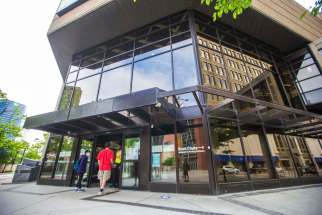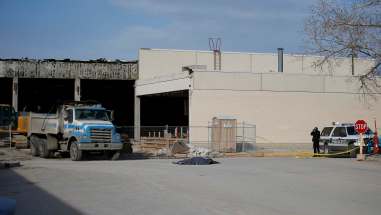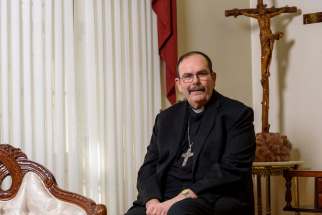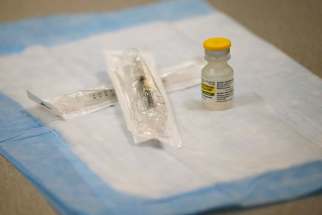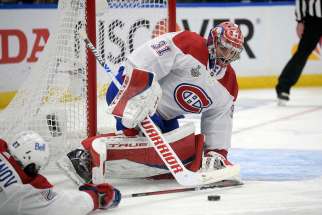Canadiens face sticking point on reconciliation
Read this article for free:
or
Already have an account? Log in here »
To continue reading, please subscribe:
Monthly Digital Subscription
$0 for the first 4 weeks*
- Enjoy unlimited reading on winnipegfreepress.com
- Read the E-Edition, our digital replica newspaper
- Access News Break, our award-winning app
- Play interactive puzzles
*No charge for 4 weeks then price increases to the regular rate of $19.00 plus GST every four weeks. Offer available to new and qualified returning subscribers only. Cancel any time.
Monthly Digital Subscription
$4.75/week*
- Enjoy unlimited reading on winnipegfreepress.com
- Read the E-Edition, our digital replica newspaper
- Access News Break, our award-winning app
- Play interactive puzzles
*Billed as $19 plus GST every four weeks. Cancel any time.
To continue reading, please subscribe:
Add Free Press access to your Brandon Sun subscription for only an additional
$1 for the first 4 weeks*
*Your next subscription payment will increase by $1.00 and you will be charged $16.99 plus GST for four weeks. After four weeks, your payment will increase to $23.99 plus GST every four weeks.
Read unlimited articles for free today:
or
Already have an account? Log in here »
Hey there, time traveller!
This article was published 29/07/2021 (1591 days ago), so information in it may no longer be current.
It was an emotional time when the Winnipeg Jets held a pre-game ceremony to honour the 215 unmarked graves of residential school children at the former residential school in Kamloops, B.C., to open the second-round NHL playoff series against the Montreal Canadiens.
For many Canadians, the genocide of residential schools became real with the news from Kamloops on May 27, so the gesture by the team a week later was an attempt to help the country learn, grow, and start to heal.
The ceremony was beautiful, capped with a sombre rendition of O Canada by Métis artist Don Amero.
As a commitment to remember the lost children, the Jets put a commemorative sticker on players’ helmets: the “Indigenized” team logo surrounded by an orange circle (referencing the annual Orange Shirt Day, Sept. 30, that recognizes residential school survivors).
With NHL permission, Jets management promised to keep the stickers on for the duration of the playoffs.
Announcers broadcast the ceremony and wore orange ribbons.
The Canadiens followed suit by putting a similar sticker on their helmets with their logo. They performed their own pre-game ceremony when the series returned to Montreal for game 3.
These gestures were meaningful; perhaps no more so than for Montreal goaltender and Ulkatcho First Nation citizen Carey Price, whose grandmother attended residential school in Williams Lake, B.C.
Price wore his sticker on the back bottom left of his helmet for the entire playoffs — even when his team did not.
Canadiens management removed the stickers from players’ helmets for the start of the third round series against the Las Vegas Golden Knights.
On the final day of that series, 751 unmarked gravesites of residential school children were uncovered at the former Marieval residential school in Saskatchewan. This came after more unmarked graves were found in Manitoba and other areas of B.C. — bringing the number to more than 1,500.
By June 28 and the start of the Stanley Cup final, TV announcers were wearing orange ribbons. Rogers Sportsnet announcer Kelly Hrudey even did an entire broadcast in an orange T-shirt.
“Canada’s team” the Canadiens, meanwhile, did nothing — well, except for Price, who quietly kept stopping pucks, the orange sticker affixed on his helmet.
The Canadiens made a late acknowledgement of these events via a bungled attempt at noon on Canada Day, as thousands of Indigenous activists demonstrated throughout the country and most Canadian NHL teams had issued condolence messages.
I say bungled because the team issued two tweets; the first recognized that “we reside on Mohawk territory” and gave condolences to Indigenous communities — a message that was quickly deleted and replaced with one that erased the reference to Mohawk territory, with a team official apologizing in a tweet that the team “didn’t know” whose land they played on.“I think we need to do a better job in the future of recognizing that this is a part of our history in Canada and it’s just not right.” — Carey Price, Montreal goaltender and Ulkatcho First Nation citizen
I sent an email to the team asking why they removed the sticker and no one responded.
I could speculate; connecting this with the rampant racism against Indigenous people in Quebec, a porous education system that has failed to teach that Montreal is unceded Haudenosaunee and Anishinaabeg territory (Kawenote Teiontiakon is the Kanien’kéha name for Montreal), or I could say Canadiens management doesn’t care for reconciliation beyond hollow, ornamental gestures. I’ll let the team’s silence speak for itself.
I can point out, though, that the only reason the Canadiens made it to the Stanley Cup final was due to their First Nations goaltender.
One can only imagine how difficult the playoffs were for Price. For most of us, the news of gravesites of First Nations children at residential schools has triggered trauma and pain. Imagine the pressure cooker of the NHL playoffs on top of that. The distraction Price had to play through is unfathomable.
And, while a sticker doesn’t mean much, the least the team could have done is show solidarity with their best player.
Price wasn’t alone, of course. There is his family (his mom was re-elected chief of his community during the playoff run), his community and others, too.
While in Winnipeg, Price spent time visiting residential school survivor Gerry “Gramma” Shingoose, who was staging a demonstration at the Catholic church right beside the Bell MTS Place. The two traded gifts; Shingoose gave him tobacco and an orange ribbon and Price gave her a game puck.
He may have had supportive teammates, too. Price is a “team guy,” the kind of goalie who during the anthem stands with his teammates instead of alone, like most goaltenders. Some may have known what he was going through, even if the team removed stickers from players’ helmets.
When the playoffs ended, Price almost immediately gave interviews calling for more education about residential schools.
He told a reporter from Sportsnet: “I think we need to do a better job in the future of recognizing that this is a part of our history in Canada and it’s just not right.”
After these playoffs, it’s hard not to think he is talking about the Canadiens.
niigaan.sinclair@freepress.mb.ca

Niigaan Sinclair is Anishinaabe and is a columnist at the Winnipeg Free Press.
Our newsroom depends on a growing audience of readers to power our journalism. If you are not a paid reader, please consider becoming a subscriber.
Our newsroom depends on its audience of readers to power our journalism. Thank you for your support.
History
Updated on Thursday, July 29, 2021 7:48 PM CDT: Corrects name of Bell MTS Place.

